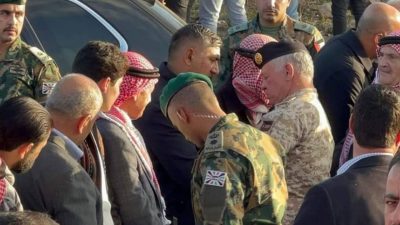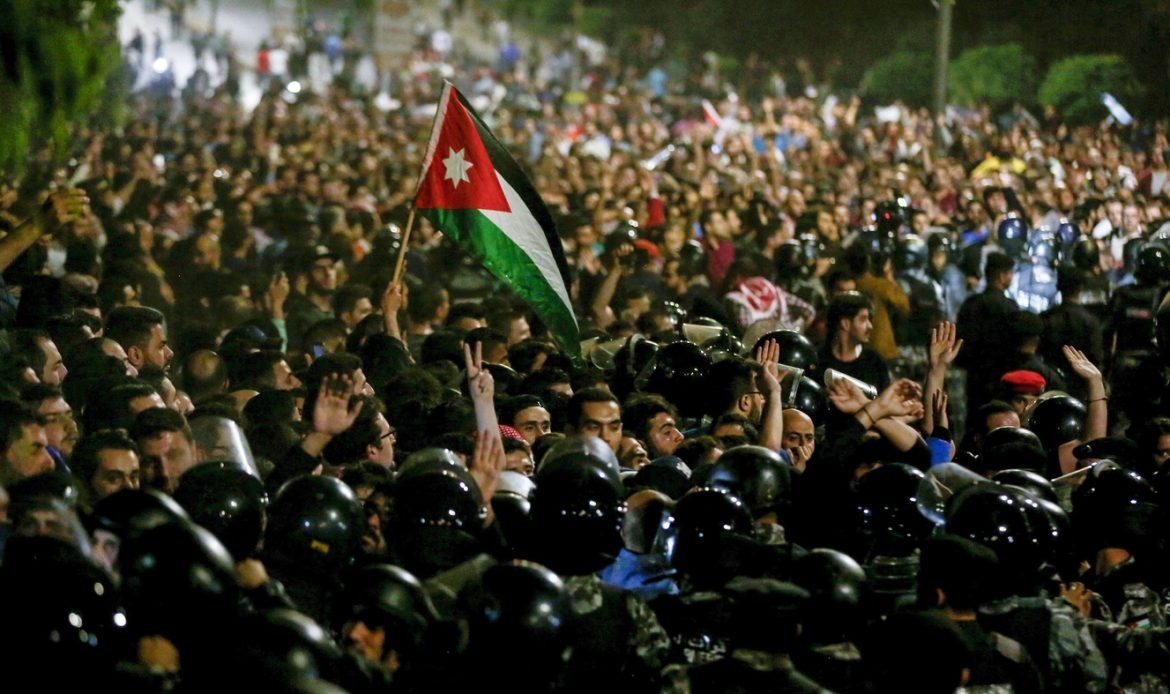Jordan Vows Crack Down on Protestors “Tied to Terrorism”
King Abdullah II of Jordan vowed on December 16 that “anyone who raises a weapon against the state will be dealt with firmly”.

All Global Research articles can be read in 51 languages by activating the Translate Website button below the author’s name.
To receive Global Research’s Daily Newsletter (selected articles), click here.
Follow us on Instagram and Twitter and subscribe to our Telegram Channel. Feel free to repost and share widely Global Research articles.
***
Yesterday, three more policemen were killed in the same area that saw the murder of the deputy police chief on Thursday and the wounding of two others. The unrest and murders occurred in the southern area near Maan. The area has supported the Radical Islamic ideology of the Muslim Brotherhood and ISIS. Large amounts of guns and ammunition were seized by the police. Experts are wondering if this might be the beginning of an uprising in Jordan. Using the cover of fuel price increases as the catalyst of a deadly uprising, recalling the 2011 staged uprising in Deraa, Syria which was engineered by the Muslim Brotherhood on the heels of a similar US-NATO attack on Libya.

Funeral of the Jordanian police officer that was killed by the Muslim Brotherhood
Dozens of people have been arrested by Jordanian security forces, accused of involvement in recent protests and violence sparked by the rise in fuel prices.
Colonel Abdul Razzaq Dalabeh, the deputy police chief of Maan province, was killed after being shot in the head on December 15 in Al-Husseiniya after he confronted protesters. Two additional policemen were shot and wounded in the same area. Reinforcements were called up to crack down on the protests and to find the killer of Dalabeh.
Fuel prices have almost doubled in Jordan in the last year. The diesel used by trucks and buses has caused major transport cost increases. Jordan depends on imports from neighboring countries by land. Home heating oil costs have made people choose between eating and heating in a country that is bitterly cold in winter and may be blanketed with snow in places.
More than a week ago, cab and truck drivers began strike actions. Bus drivers and merchants joined them with shops shuttered in protest on December 14. Protests then escalated to blocking roads with burning tires and confrontations with security forces.
Previous fuel increases and protests
In 1999, Abdullah II bin Al-Hussein took the throne as King of Jordan. The following year Bashar al-Assad was elected President of Syria.
In 2012, Jordan increased gasoline prices by 10% which resulted in protests. That was the year after the Syrian conflict began.
Jordan has no oil or gas resources
Jordan is located in the Middle East and surrounded by some oil-rich nations like Iraq and Saudi Arabia, but Jordan has no oil or gas resources, is dependent on imports, and is affected by the increasing prices of energy caused in part by the Ukrainian conflict.
The IMF loan
The International Monetary Fund (IMF) is headquartered in Washington, DC. approved a $2 billion loan in 2012, and called for Jordan to increase their fuel prices to the consumers, which resulted in protests. Jordan’s economy was under extreme pressure as thousands of Syrian refugees poured over the border into the Zaatari camp.
Jordan participated in the attack on Syria
The King of Jordan played a pivotal role in the US-NATO attack on Syria orchestrated by President Obama. The King can’t say no to the US because Jordan receives a great deal of its annual budget from the US government. Many of the weapons and fighters in Syria came through the Jordanian border at Deraa, which was the staging place of the “uprising”. The US government sent the weapons they had confiscated in Libya, while overthrowing the government there, to be transported to Syria via the Jordanian border at Deraa. The Al Omari Mosque in Deraa in March 2011 became the arsenal for the terrorists following the Muslim Brotherhood ideology. Jordan has always had Muslim Brotherhood followers in the country and has suffered violent attacks by them in the past. The Muslim Brotherhood is an internationally recognized terrorist group following Radical Islam, but the US has never banned it.
Part of the US plan for regime change in Syria was the establishment of refugee camps, such as in Turkey, Lebanon, and Jordan. The refugees living in camps perpetuate an image that Syria is not safe enough to live in, and this promotes the regime change goal. In reality, Syrian refugees have returned from Germany, Turkey, Lebanon, and Jordan. The Lebanese government is in the process of sending refugees back home, especially those that were in the Arsal camp which was populated by Muslim Brotherhood terrorists and their wives and children. In the upcoming Turkish Presidential elections in six months, all the parties vying for the office have pledged to forcefully return all the refugees to Syria.
Jordan is facing violence carried out by domestic terrorists. President Assad had said that if you feed a monster, it may turn to bite you. The monster is Radical Islam. US Secretary of State Hillary Clinton testified before the US Congress and admitted, “we created them”, which referred to Al Qaeda and how the CIA had created the terrorist group to fight for US interests in Afghanistan against the Soviet Union. Al Qaeda, the US-sponsored Free Syrian Army, Jibhat al-Nusra, Hayat Tahrir al-Sham, and finally ISIS all have the same ideology, which is the foundation of the Muslim Brotherhood.
Jordan participated in the US-NATO attack on Syria, and after 12 years is facing the same terrorist ideology, but this time directed at the Amman government, instead of Damascus. The monster has turned to bite the hand that fed it.
Israeli occupation
More than half of the 6.3 million population of Jordan is Palestinian. They are the survivors and descendants of the founding of Israel in 1948 and were made refugees after their homes, farms, and businesses were taken by Israeli settlers. The UN has registered over 2 million Palestinian refugees in Jordan.
In April, the leaders of Jordan, Egypt, and the UAE met together in solidarity with the Palestinian people. The leaders called on Israel to stop all actions that undermine the two-state solution and to return to negotiations to resolve the Israeli-Palestinian conflict under UN resolutions.
Egypt’s President Abdel Fattah El-Sisi received Jordan’s King Abdullah and Abu Dhabi’s Crown Prince Sheikh Mohammed bin Zayed at Cairo Airport, and they stressed “the importance of sustaining efforts to restore calm in Jerusalem, and the need to respect the legal and historical status quo at Al-Aqsa Mosque.”
On December 17, President Mahmoud Abbas of the Palestinian Authority called King Abdullah II of Jordan and said, “the State of Palestine and its people are keen on the security and stability of Jordan”, and that “the security and prosperity of Jordan are part of the security and prosperity of Palestine”.
Abbas thanked the King for his unending support of the Palestinian cause, which is tied to the Jordanian custodianship over Islamic and Christian holy places in Jerusalem.
The King is the custodian of the Al Aqsa Mosque in Jerusalem and is a 41st-generation direct descendant of the Islamic prophet Muhammad. The king of Jordan, its mainly Palestinian population, and his Palestinian wife, Queen Rania, are all tied to the past, present, and future of Palestine.
On December 18, Israeli occupation forces blocked the main entrance to the town of Azzun, east of Qalqilia city in the northern West Bank. Israeli forces shut down the main entrance to the town with a metal gate, blocking the movement of Palestinian traffic through the entrance.
Human rights groups have said,
“Restricting movement is one of the main tools Israel employs to enforce its regime of occupation. Israel imposes restrictions on the movement of Palestinians within the West Bank, and travel between it and the Gaza Strip, into East Jerusalem, Israel, and abroad.”
The violence now brewing in Jordan may be tied to the King’s resistance to the occupation of Palestine.

Massive Protests in Jordan against the rise of fuel prices
*
Note to readers: Please click the share buttons above. Follow us on Instagram and Twitter and subscribe to our Telegram Channel. Feel free to repost and share widely Global Research articles.
This article was originally published on Mideast Discourse.
Steven Sahiounie is a two-time award-winning journalist. He is a regular contributor to Global Research.
All images in this article are from MD; featured image: King of Jordan giving his condolences to the family of the police officer that was killed


No comments:
Post a Comment